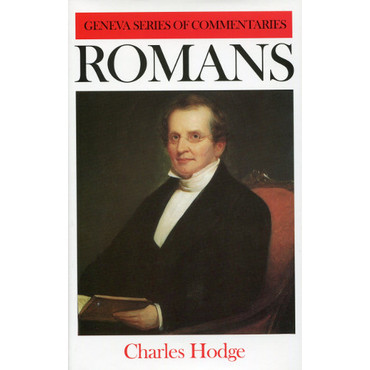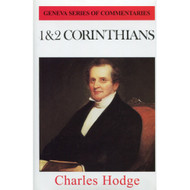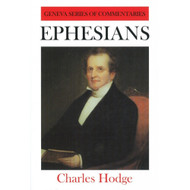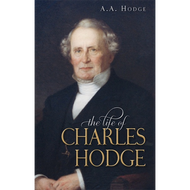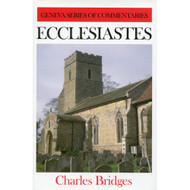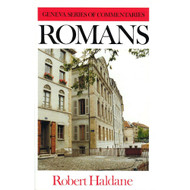Categories
Categories
Romans Geneva Commentary Series by Charles Hodge (Hardcover)
Product Description
About the Author
Scholar, educator, churchman, and distinguished American Presbyterian systematic theologian of the nineteenth century, Charles Hodge was born in Philadelphia in 1797. Following his father's untimely death a few years after he was born, Charles and his brother were raised by their godly widowed mother. In 1812 Hodge's mother moved the family to Princeton in hope of matriculating her sons at Princeton College.
Charles Hodge graduated from Princeton College in 1815. During the 1814-15 school year a revival broke out on the college campus: Charles was one of a number of students converted during this time of spiritual refreshing. At the encouragement of Archibald Alexander, he enrolled at Princeton Theological Seminary, graduating with the class of 1819.
Ordained in 1821, his scholarly gifts led to an appointment by his denomination in 1822 to serve as the seminary's third faculty member. As Professor of Oriental and Biblical Literature, Hodge's primary responsibility was instruction in biblical languages, hermeneutics, biblical criticism, and study of Old Testament texts. During 1826-28, he travelled to Europe to study with the leading European biblical and theological scholars. Hodge focused his studies on theology and biblical interpretation, with additional concentration in Semitic and cognate languages. His studies in Europe made him one of the leading Hebraists teaching in an American theological institution in the early nineteenth century. In the coming decade, Hodge would be assisted by the linguistic talent and philological expertise of Joseph Addison Alexander.
With Addison's arrival, Hodge concentrated his labours on New Testament texts and studies, serving as Professor of Exegetical and Didactic Theology from 1840 to 1854. From 1854 until his death in 1878, he served as Professor of Exegetical, Didactic, and Polemic Theology.
During his half-century tenure at Princeton, Charles Hodge held several chairs, but is probably best remembered for the reputation he established as Professor of Systematic Theology. A stout Calvinist with a deep love for the Reformed confessions, his literary labours often involved a polemical thrust, as he sought to defend and expound the Reformed theology of the Protestant Reformation, and the teachings of the Westminster Confession and the Larger and Shorter Catechisms, as received and adopted by the Presbyterian Church in the United States of America.
Charles Hodge graduated from Princeton College in 1815. During the 1814-15 school year a revival broke out on the college campus: Charles was one of a number of students converted during this time of spiritual refreshing. At the encouragement of Archibald Alexander, he enrolled at Princeton Theological Seminary, graduating with the class of 1819.
Ordained in 1821, his scholarly gifts led to an appointment by his denomination in 1822 to serve as the seminary's third faculty member. As Professor of Oriental and Biblical Literature, Hodge's primary responsibility was instruction in biblical languages, hermeneutics, biblical criticism, and study of Old Testament texts. During 1826-28, he travelled to Europe to study with the leading European biblical and theological scholars. Hodge focused his studies on theology and biblical interpretation, with additional concentration in Semitic and cognate languages. His studies in Europe made him one of the leading Hebraists teaching in an American theological institution in the early nineteenth century. In the coming decade, Hodge would be assisted by the linguistic talent and philological expertise of Joseph Addison Alexander.
With Addison's arrival, Hodge concentrated his labours on New Testament texts and studies, serving as Professor of Exegetical and Didactic Theology from 1840 to 1854. From 1854 until his death in 1878, he served as Professor of Exegetical, Didactic, and Polemic Theology.
During his half-century tenure at Princeton, Charles Hodge held several chairs, but is probably best remembered for the reputation he established as Professor of Systematic Theology. A stout Calvinist with a deep love for the Reformed confessions, his literary labours often involved a polemical thrust, as he sought to defend and expound the Reformed theology of the Protestant Reformation, and the teachings of the Westminster Confession and the Larger and Shorter Catechisms, as received and adopted by the Presbyterian Church in the United States of America.
Publisher's Description
Charles Hodge, who for fifty -six years from 1822 to 1878 - lectured on the Pauline Epistles at Princeton Theological Seminary, issued the final version of his Commentary on Romans in 1864. It was at once recognized as belonging to the number of the few truly great works on this Epistle and that verdict has been upheld by Christian leaders down to the present day.
 Loading... Please wait...
Loading... Please wait... 
